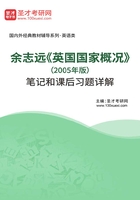
第5章 英帝国的兴起和衰落(1688—1990)
5.1 复习笔记
Ⅰ.Whigs and Tories
Ⅱ. Agricultural Changes in the Late 18th Century
Ⅲ. The Industrial Revolution (1780—1830)
Ⅳ. The Chartist Movement (1836—1848)
Ⅴ. Trade Unions and the Labour Party
Ⅵ.Colonial Expansion
1.The growth of dominions
2.The Conquest of India
3.The Scramble for Africa
4.Aggression against China
Ⅶ.Twentieth Century
1.Britain and the First World War
2.Britain Between the Two World Wars
3.Britain and the Second World War
4.Postwar Britain
Ⅰ.Whigs and Tories
These two party names originated with the Glorious Revolution (1688). The Whigs were to form a coalition with dissident Tories in the mid-19th century and become the Liberal Party. The Tories were the forerunners of the Conservative Party.
Ⅰ.辉格党和托利党
这两大党派起源于光荣革命时期(1688)。19世纪早期,辉格党和托利党联合,后来变成了自由党。托利党是保守党的前身。
Ⅱ. Agricultural Changes in the Late 18th Century
1. Farming was an important occupation in England in the 18th century.
2. In the mid-18th century the population in England increased rapidly, depending on the countryside for food.
3. Enclosure became more frequent after 1740 and climaxed during the turn of the century. Agricultural enclosure had good as well as bad results.
Ⅱ. 18世纪晚期的农业变化
1. 18世纪,农业是英国一个重要的职业。
2. 18世纪中期,英国的人口增长迅速,主要依靠农村的粮食供给。
3. 1740年以后,圈地运动更为频繁,世纪之交时达到高潮。圈地运动既带来了好的结果,又带来了坏的结果。
Ⅲ. The Industrial Revolution (1780—1830)
1. The Industrial Revolution refers to the mechanization of industry and the consequent changes in social and economic organization in Britain in the late 18th and early 19th centuries.
2. As a result of the industrial revolution, Britain was by 1830 the “workshop of the world”.
Ⅲ.工业革命 (1780—1830)
1.工业革命指的是18世纪晚期和19世纪早期英国的工业机械化以及所带来的社会和经济的变化。
2.由于工业革命,到1830年,英国成为“世界工厂”。
Ⅳ. The Chartist Movement (1836—1848)
1. There was widespread dissatisfaction with the Reform Act of 1832 and the New Poor Law. In 1836 a group of workers formed the London Working Men’s Association. It aimed “to seek by every legal means to place all classes of society in possession of equal political and social rights”.
2. Chartism failed but the Chartist movement was the first nationwide working class movement and drew attention to serious problems.
Ⅳ.宪章运动 (1836—1848)
1. 1832年的《改革法案》和《新济贫法》引起了广泛的不满。1836年,一群工人组成了伦敦工人协会。目的在于“通过合法手段,使社会的所有阶级都能享有平等的政治和社会权利”。
2.宪章运动失败了,但是它是第一次全国范围内的工人阶级运动,引起了人们对严重问题的注意。
Ⅴ. Trade Unions and the Labour Party
1. After the Chartist Movement, a new kind of trade unionism developed among skilled workers, such as the Amalgamated Society of Engineers (ASE).
2. In 1900, representatives of trade unions, the Independent Labour Party and other socialist societies set up the Labour Representation Committee (LRC). The LRC changed its name to the Labour Party in 1906.
Ⅴ.工会和工党
1.宪章运动之后,技术娴熟的工人中形成了一种新型的工会联盟,比如工程师联盟。
2. 1900年,工会和独立工党的代表以及其他社会组织成立了工党代表委员会。1906年更名为工党。
Ⅵ.Colonial Expansion
1. The growth of dominions
①In the late 18th century Britain acquired vast territories: Canada, Australia, and New Zealand.
②Canada was ceded to Britain by the 1763 Treaty of Paris.
③In 1901, the independent Commonwealth of Australia was established.
④New Zealand became a dominion under the British crown in 1907, and was made completely independent in 1931.
Ⅵ.殖民扩张
1.领土扩张
①18世纪晚期,英国占领了大片领土:加拿大,澳大利亚和新西兰。
②1763年的《巴黎和约》规定加拿大割让给英国。
③1901年,独立的澳大利亚联邦成立。
④1907年,新西兰成为英国国王统治下的一个自治地区。1931年完全独立。
2.The Conquest of India
①By 1819 the British conquest of India was almost complete.
②In 1857 the native troops of the Bengal army mutinied. Then the control of India passed to the British Crown in 1858.
2.征服印度
①1819年,英国征服了几乎整个印度。
②1857年,孟加拉军队的印度士兵发生叛乱。1858年,英国国王控制了整个印度。
3. The Scramble for Africa
By 1900 more than 9/10 had been colonized. Britain took over vast productive areas of Africa, but France, Portugal, Belgium, Germany and Italy all claimed a share.
3.抢夺非洲
1900年,超过十分之九的非洲都沦为了殖民地。英国占领了非洲的广大富饶之地,但是法国,葡萄牙,比利时,德国和意大利都有一定的份额。
4. Aggression against China
①The British colonialists launched a war of aggression against China in 1840. The Treaty of Nanking (Nanjing) was signed. A second war (1856—1858) ended with the treaties of Tianjin (1858).
②By 1900 Britain had built up a big empire, “on which the sun never set”. It included 25 % of the world’s population and area.
4.侵略中国
①1840年,英国殖民者发起了对中国的侵略战争,签订了《南京条约》。1856年发动了第二次鸦片战争,签订了《天津条约》。
②到1900年,英国建立了强大的日不落帝国,它统治了全球四分之一的人口和地区。
Ⅶ.Twentieth Century
1. Britain and the First World War
The war was fought from 1914 to 1918. During World War Ⅰ Britain lost over a million people and suffered considerable disruption of the economy and society.
Ⅶ.二十世纪
1.英国和第一次世界大战
第一次世界大战开始于1914年,结束于1918年。一战期间,英国损失了一百多万人口,经济和社会遭受了巨大的破坏。
2. Britain Between the Two World Wars
The First World War had great effects on British society. The postwar boom was over within two years. There were strikes and hunger marches and political unrest.
2.一战和二战期间的英国
第一次世界大战对英国社会有很大的影响。战后繁荣在两年之内结束。罢工,反饥饿游行和政治动乱不断。
3. Britain and the Second World War
①The German troops invaded Poland on September 1, 1939. Chamberlain was forced to declare war on Germany on September 3.
②Winston Churchill took over as Prime Minister in 1940. He led his country to final victory in 1945.
③In the Second World War, Britain lost one-quarter of her national wealth and entered upon a period of economic difficulties.
3.英国和第二次世界大战
①1939年9月1日,德国入侵波兰。张伯伦于9月3日被迫宣布英国参加二战。
②温斯顿•丘吉尔于1940年担任首相。他领导英国于1945年取得最终胜利。
③第二次世界大战期间,英国损失了四分之一的国家财富,进入了经济困难时期。
4.Postwar Britain
①The war hastened the end of Britain’s empire. India, Burma and several British colonies in Africa won their independence.
②When George Ⅵ died in 1952, Princess Elizabeth was crowned Queen Elizabeth Ⅱ in Westminster Abbey.
③The 1960s were the Swinging Sixties, the permissive age.
④In January, 1973, Britain finally became a full member of the European Economic Community.
⑤The election of 1979 returned the Conservative Party to power and Margaret Thatcher became the first woman prime minister in Britain.
⑥In 1982 the Falkland Islands War broke out.
4.战后的英国
①战争加速了英帝国的瓦解。印度,缅甸和非洲其他的英国殖民地都相继赢得独立。
②1952年乔治六世去世,伊丽莎白公主在威斯敏斯特教堂加冕为伊丽莎白二世继位。
③20世纪60年代是活跃的,自由的年代。
④1973年1月,英国成为欧洲经济共同体的一员。
⑤1979年的大选使保守党再次掌权,玛格丽特•撒切尔成为英国第一位女首相。
⑥1982年,福克兰岛战争爆发。